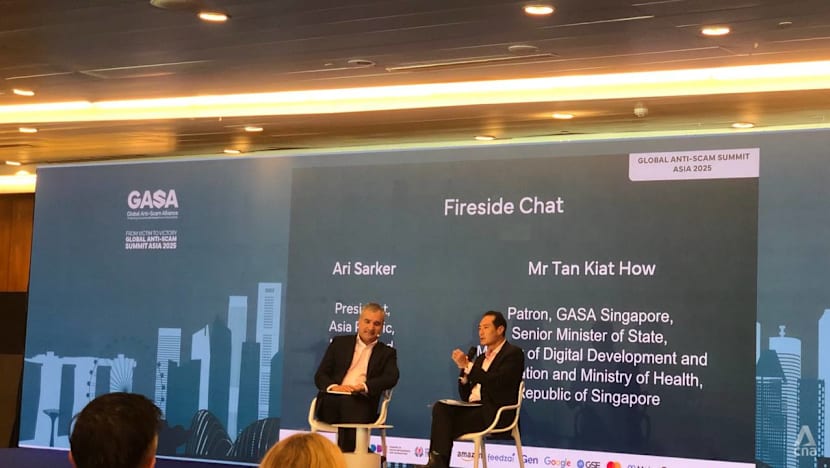Singapore's GovTech joins global initiative to disrupt scams by exchanging real-time data
GovTech is the first government agency globally to commit to exchanging scam data, said the Global Anti-Scam Alliance.

Senior Minister of State for Digital Development and Information Tan Kiat How speaking at the opening of the Global Anti-Scam Summit Asia 2025, on Sep 2, 2025. (Photo: CNA/Natasha Ganesan)

This audio is generated by an AI tool.
SINGAPORE: Singapore's Government Technology Agency (GovTech) has joined a global initiative that shares real-time data to better detect and disrupt scams, Senior Minister of State for Digital Development and Information Tan Kiat How said on Tuesday (Sep 2).
He announced this on the first day of the Global Anti-Scam Summit Asia 2025, held in Singapore by the Global Anti-Scam Alliance (GASA), an international non-profit aimed at protecting consumers worldwide from scams and online fraud.
In a press release, the alliance said GovTech is the first government agency globally to commit to exchanging "scam signals".
The initiative, known as the Global Signal Exchange, tracks over 400 million threats in real time and allows its more than 100 member organisations to rapidly share information for scam disruption.
Separately, GASA also released a report on the state of scams in Southeast Asia, which surveyed 6,000 people across six countries in Southeast Asia, including Singapore.
During the summit's opening, Mr Tan, who is patron of the anti-scam alliance's Singapore chapter, said the "most important power" to combat increasingly sophisticated and fast-changing scam threats was through partnerships and collaboration.
This is something that cannot be easily replicated by the bad actors, said Mr Tan.
Pointing out that syndicates behind scams are likely globalised and international, and hard to pin down, he said bringing in more partners such as government agencies, law enforcement organisations and tech companies, will enlarge and strengthen the network against scammers.
Speaking to reporters after the opening, Mr Tan added that joining the Global Signal Exchange means having more information at hand and sharing threat intelligence such as URLs used by scammers and the latest scam tactics.
"I think having more information at our fingertips and sharing our information as well helps to enrich the entire threat ecosystem and allows us to take action earlier," he added.
SCAMS IN SOUTHEAST ASIA
On Tuesday, Mr Tan also announced that Google's philanthropic arm, Google.org, will be providing US$5 million (S$6.4 million) in funding to the Association of Southeast Asian Nations (ASEAN) Foundation to expand online scam prevention resources to 3 million people across the region.
This comes on the back of 63 per cent of adults in the region claiming that they had experienced a scam in the last 12 months, according to GASA's latest Southeast Asia report.
Respondents above 18 from Singapore, Malaysia, Indonesia, Thailand, Vietnam and the Philippines were quizzed through an online survey about the type of scams they experienced and the amount they lost over the 12-month period.
The study found that 66 per cent of adults in Singapore claimed to have encountered scams, compared to 73 per cent in Malaysia and 77 per cent in Vietnam.
Investment scams were the most common type of scam experienced by those surveyed, followed by unexpected money - where victims are asked to pay up front to receive money or a prize - and impersonation scams.
Scam encounters in Southeast Asia took place most frequently on Facebook (53 per cent) and WhatsApp (51 per cent).
An estimated US$23.6 billion was lost to scammers in Southeast Asia in the past 12 months. Respondents from Singapore, in particular, lost more than US$2,000 per person on average – the highest among the six countries surveyed.
That said, scam reporting and financial recovery of losses were more common in Singapore than in the other Southeast Asian countries.
Commenting on the report, GASA's managing director Jorij Abraham said that online scams were not just a "consumer inconvenience" but also a global security challenge that undermines digital trust and economic resilience.
"Criminal networks are moving faster than our protections, but it is possible to close the gap," he added.
"GASA's mission is to provide the infrastructure and partnership needed to close this gap - uniting efforts across sectors and borders to build a stronger, collective defence."
During a media briefing, Mr Abraham had high praises for Singapore, saying the country was becoming a "best practice" on how other countries can fight scams, citing the Singapore Police Force's Anti-Scam Centre as an example.
This was echoed by CEO and co-founder of the Global Signal Exchange Emily Taylor who called Singapore a "best practice" exemplar for the rest of the world.
"We are excited to make this journey together, and (I) thank GovTech for their trust in us."
Editor's note: This article has been amended after the Global Anti-Scam Alliance clarified that the figures it provided for Singapore, Malaysia and Vietnam refer to the proportion of adults who encountered scams in the past year, and were not increases.
















